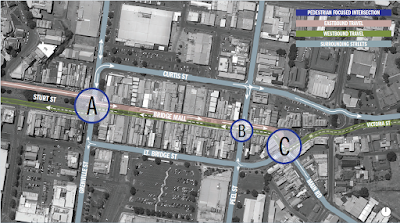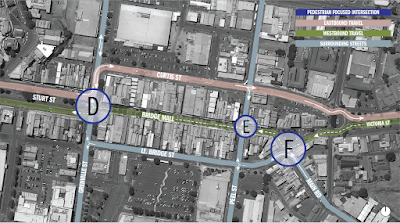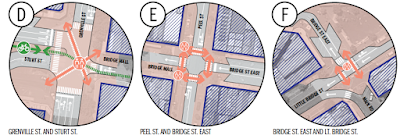So! The saga of the Bridge Mall continues. In my last post on the topic, I pointed out that there was a lot to like about the City of Ballarat's draft Bakery Hill and Bridge Mall Urban Renewal Plan, but that there was one very retrograde step proposed - reopening Bridge Mall to cars. Unfortunately they not only went ahead with this idea in the final plan, but have progressed it much faster than all the good stuff - they announced the designer in May, and have now narrowed the project down to three options which have been put out to consultation.
First of all, I want to reiterate that I fundamentally disagree with bringing cars back to Bridge Mall. For the reasons I outlined in my last post, and the one before that, it absolutely will not be the thing that magically saves it. The Mall needs more people, not more parking. It needs more passive surveillance, which pedestrians and cyclists provide but passing cars don't. It needs a greater diversity of uses, with more people coming into the precinct at a wider range of times for a wider range of reasons - bringing cars back does not help this at all. In fact, because bringing cars back to the precinct reduces space for pedestrians, and makes it less safe for them, it will probably actively hinder those things.
The idea isn't even a particularly popular one - opinion among Bridge Mall traders and members of the general public is, and always has been, very divided. Some have certainly been furiously demanding it happen for many years, but every time it's brought up you get a lot of people demanding it doesn't happen, too.
So I still hold out hope that Council will see the light and cancel the traffic project, and redirect the funds to something that actually would help improve the Mall. As I mentioned last time, simple things like allowing bikes and fixing the constantly-broken street lights would be a good place to start. Given how many people keep suggesting it in the comments on Courier articles, I'm going to add "covering more of it with a roof" to this list - providing more weather protection would make it a more pedestrian-friendly environment so this seems like it would have merit.
But for whatever reason, they do seem pretty keen to bring cars back in one form or another, so let's take a look at the three options they've put forward.
Two-way traffic
 |
| The two-way traffic option |
This option would see cars travelling in both directions along Bridge Mall. Westbound traffic could come down Victoria Street, past Maccas, and turn right onto Bridge Street (which is currently impossible because it's one-way in the other direction). Cars could continue across Peel Street, through the Mall and then up Sturt Street. Eastbound traffic could come down Sturt Street and through the Mall, but when they reached Little Bridge Street they would have to turn right, looping back on themselves; Little Bridge is one-way so they couldn't head uphill, and Main Rd is one-way so they couldn't head across there either.
 |
| The top intersection in the two-way option |
The big problem with this option is how much space is given over to cars. 13m of the 20m corridor would be allocated to either driving or parking cars, leaving just 3.5m for pedestrians and 2.5m for things like outdoor dining. Notably there is no space allocated to cyclists - it seems as though they'll be expected to "take the lane" with the cars.
Despite what the diagram shows, the text of the document indicates that the two-way traffic option would mean "removal of all trees in the mall".
This option would represent the absolute destruction of Bridge Mall, and create not a street but a road. It must be avoided at all costs.
 |
| The allocation of space is stark, and would result in all trees being removed |
One-way westbound
 |
| The westbound traffic option |
This option would involve cars driving down Victoria Street, past the new "grand entrance", and turning right onto Bridge Mall. Cars would flow through the Mall and then up Sturt Street. This would mean reversing the current one-way section on Bridge Street East. From the "intersection studies" it doesn't look like Main Rd would change at all, so it'd only be cars coming off Little Bridge, not coming across from Main Rd.
 |
| Intersection details for the westbound option |
This one-way option would mean more available space for pedestrians and other aspects of "street life" like outdoor dining, compared to the two-way option, but again no space has been allocated for cyclists. Study D above seems to show cyclists travelling only one way onto the Sturt Street path, not in both directions. Legally there would be no issue with making the road one-way for cars but two-way for bikes - Prentice Street in Brunswick has this, with painted contraflow bike lanes and a "No entry, bicycles excepted" sign at the entrance. (Prentice Street seems to have been retrofitted with a fairly hasty paint job, but with a revamp project like this it would be easy to integrate it properly and make it look nicer).
From my conversations with Council officers it seems that the contraflow option will probably be what ultimately happens - they were at pains to emphasise that the document's hierarchy of pedestrians, then cyclists, then cars matched their priorities - but they weren't able to commit to any specifics until the detailed design work takes place. Which won't happen till the high-level direction is picked.
 |
| Space allocation in the one-way options |
This option also treats Bridge Mall as something of a thoroughfare, with the expectation that people would drive into town, past the "grand entrance", and then through the Mall before continuing up Sturt. It is therefore very much geared towards through-traffic, which conflicts with the stated purpose of the project. If, as the proponents claim, you want people to be coming into the Mall so they stop and shop at the stores and add liveliness to the place, encouraging them to drive through it on their way somewhere else is pretty pointless.
 |
| Potential "grand entrance" at the bottom of Victoria Street |
As I said last time, there is no need to connect the "grand entrance" thing with the project to bring cars back to Bridge Mall. People could get the terminating vista effect of whatever it is as they come down Victoria Street, and then once they passed it, they could just continue down Little Bridge Street as they do now. Little Bridge could do with some beautification, and should at some stage of the wider Bakery Hill plan, but turning off to drive down the Mall really doesn't add anything to the "grand entrance" thing - so it cannot be used as justification.
One-way eastbound
 |
| The eastbound traffic option |
This version would see cars come down Sturt Street and into the Mall, but when they got to Little Bridge Street they wouldn't be able to turn left and head uphill to Victoria Street, because Little Bridge would remain one-way. Anyone who did want to head up Victoria would need to use Curtis Street, either turning off at Grenville to avoid the Mall entirely, or turning off at Peel. Cars that reached Little Bridge would either need to turn right and loop back the way they'd come, or potentially cross Little Bridge and head along Main Road.
The consultation document notes this as a challenge - they would need to completely redo the intersection with Main Road, and reorient it - it's currently one-way heading towards Little Bridge, and they'd need to reorient it to one-way heading away from Little Bridge. This would mean expensive refits of the angled parking and the street furniture that they've only very recently installed. From conversations with Council officers I got the impression that the Main Road thing would not be likely to happen immediately, and may not happen at all - the priority would be to get traffic flowing through Bridge Mall itself, then assess what other changes might be needed.
The same issues exist with the eastbound as the westbound, in terms of cyclists - no clear indication in the document that any real provision would be made for them, just "take the lane" in the direction cars are headed, and potentially small contraflow lanes in the other direction.
If you put a gun to my head and said that I had to pick one of these three models, I think it would probably be the one-way eastbound - but to me it'd be important to specify how I wanted it to proceed. A good solution for cyclists would be key - there would need to be provision for bikes to ride in both directions, and if they're going to be sharing space with cars then it underscores the need for traffic calming measures even more.
I'd also get rid of the Main Road aspect. Leave it as it is today, don't install any crossing over Little Bridge, just make it so that cars that reach that point must turn right onto Little Bridge to loop back on themselves.
This would largely negate Bridge Mall's usefulness as a through-route or rat-run, so it'd make people less likely to barrel through at speed, on their way to somewhere else - cars could enter, but the only reason it'd make sense for them to enter would be to actually park and shop there. This would keep the number of cars lower, and also their speeds lower - they won't be impatiently trying to get through as fast as they can, they'll be rolling along slowly looking for a park. This would represent the safest and most inviting environment for pedestrians, cyclists, street diners, families with kids at the playground, etc.
However I would like to take this a step further and propose a fourth option - a hybrid model that takes this further.
A hybrid model
Regular readers of my blog may remember my time in Barcelona, visiting its Superilles ("Superblocks"). If you don't remember/can't be bothered reading it, this video is a good short explainer.
 |
| Internal streets are made one-way, so everywhere is accessible but there's no through-traffic |
One of the core concepts of the Superilles is that cars, delivery vehicles, etc can enter them but not pass through them; local traffic can still enter to do what they want to do, but through-traffic must go around. The main way that this is achieved is through opposing one-way streets - cars can enter the street, but they'll follow the one-way system to be turned around. This keeps the number of vehicles that want to enter the precinct to a minimum, and combined with a bunch of other measures, helps keep their speeds low. Cyclists and pedestrians are of course free to travel in whatever direction they like - and they do so in great numbers.
 |
| A playground on reclaimed street space in a Superilla (from this video) |
We could achieve fundamentally the same thing with Bridge Mall if we make it so that the eastern block remains eastbound (as it is today) and the western block is opened to westbound traffic only. This would mean cars could enter the precinct via Peel Street, and either turn left or right as needed in order to park out the front of whatever business they wanted to visit, then flow out of the precinct once they were done - but it would mean that it was impossible for someone to drive all the way through the precinct from one end to the other, and treat it as a thoroughfare.
 |
| Concept image of diverging one-way streets |
This would effectively limit it to local vehicle traffic, so traffic volumes would remain low, speeds would remain low - and therefore pedestrian numbers would remain high. The inclusion of contraflow cycling lanes would bring cyclists into the precinct who are currently banned, and bring their passive surveillance and their disposable income with them.
You can give feedback to council here - submissions close this Thursday 20 August
Hat-tip to Aaron B on Twitter who helped me out with the Prentice Street example.



No comments:
Post a Comment